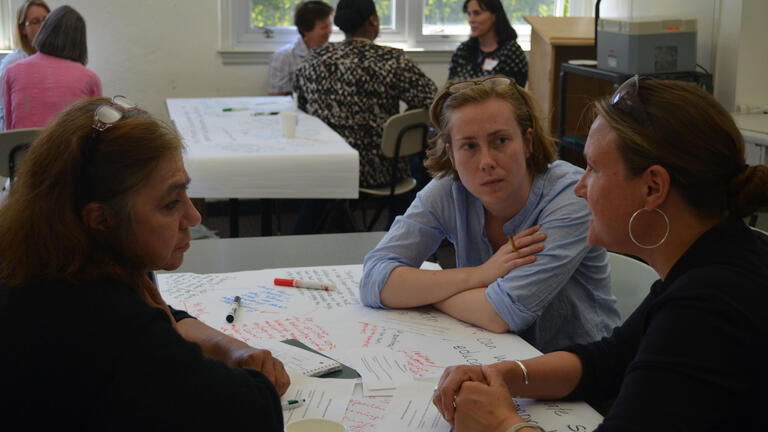Human Rights Education: Pedagogy & Praxis
A central goal of the USF School of Education’s strategic plan, adopted in 2014 has been “to collaborate and work in solidarity with partners to build a stronger movement for social justice in education.” One example of how this goal has been enacted is a unique partnership between the International & Multicultural Education (IME) Department and the Bay Area-based, non-profit organization, Voice of Witness, in teaching a core course, Human Rights Education: Pedagogy & Praxis. This course, taught by IME professor Susan Katz since 2007, is designed for educators in both schools and informal settings and aims to model how to teach human rights through exemplary pedagogy, such as oral history and the creative arts. To demonstrate human rights education in action, the course focuses on different case studies intertwined with racism, discrimination against women and children, and poverty.
Established in 2005, Voice of Witness (VOW) “promotes human rights and dignity by amplifying the voices of people impacted by injustice.” Voice of Witness’s oral history book series and education programming, which serves over 20,000 people annually, illuminate human rights crises both within the United States and globally. Education Program Director, Cliff Mayotte, has been providing oral history training in different IME classrooms for several years. Through that process, he has been demonstrating how personal stories can be transformative and how capturing the stories of those who are often unheard can be paramount in addressing human rights crises.
Working together in the Human Rights Education: Pedagogy & Praxis course has given Voice of Witness a more consistent and coherent presence than ever before. For the second year in a row, VOW via Cliff has been involved in all aspects of the course, from planning the curriculum with Dr. Katz to providing the primary texts from its oral history series, to bringing in guest speakers who are authors in these texts, and showing students how to conduct oral histories. Their oral histories serve as the centerpiece of their final course projects, which are based upon research on human rights issues of their own choice. Students culminate the course with a pedagogical tool that they then can bring into their own classroom or community setting.
The impact of this partnership on IME students has been powerfully positive, evident in comments by students in the Spring 2016 course. As Star Moore, IME doctoral student and Director of Community-Engaged Learning at USF, described: “The collaboration between the Human Rights Education course and Voice of Witness was essential to bridging our understanding of theory and practice. Voice of Witness staff and oral history contributors provided unique and critical perspectives on specific human rights issues, as well as guidance about how to collect oral histories in a way that honors the lived experience of those who are oppressed and marginalized. This course was definitely a model of how community wisdom can enrich academic scholarship.”
Similarly, MA student Hailey Vincent stated, “I was able to tap into skills I hadn't used in years and develop a new confidence in writing, interviewing and storytelling I had long forgotten I possessed. This course pushed me to explore empathy on new levels and gave a real first hand look at human rights around the globe through powerful voices.”
“This course showed me that sometimes seeing the 'big picture' when looking at human rights issues is to invest in the details of individual stories,” explains MA student Jacqueline Eugster. “It reminded me personally how to be grounded and remain focused on the work that I love, and that change occurs in very small spaces (at first). These efforts are just as important as the mass marches and campaigns.”
Thanks to support from the School of Education for this collaboration between IME and VOW, the university and the community are able to come together in mutually beneficial ways and break down walls that too often exist between theory and practice. Hopefully, this example will serve as an inspiration for others at USF, and provide a partnership model for other universities around the country.
"The need for oral histories has never seemed greater than this moment in history," says EdD student Jane Pak. "We must break down divides and take the time to listen and learn about others and personal stories are wonderful and impactful ways of doing this. This course and the partnership with VOW were true reflections of what human rights education aims to be - about, through, and for human rights."
